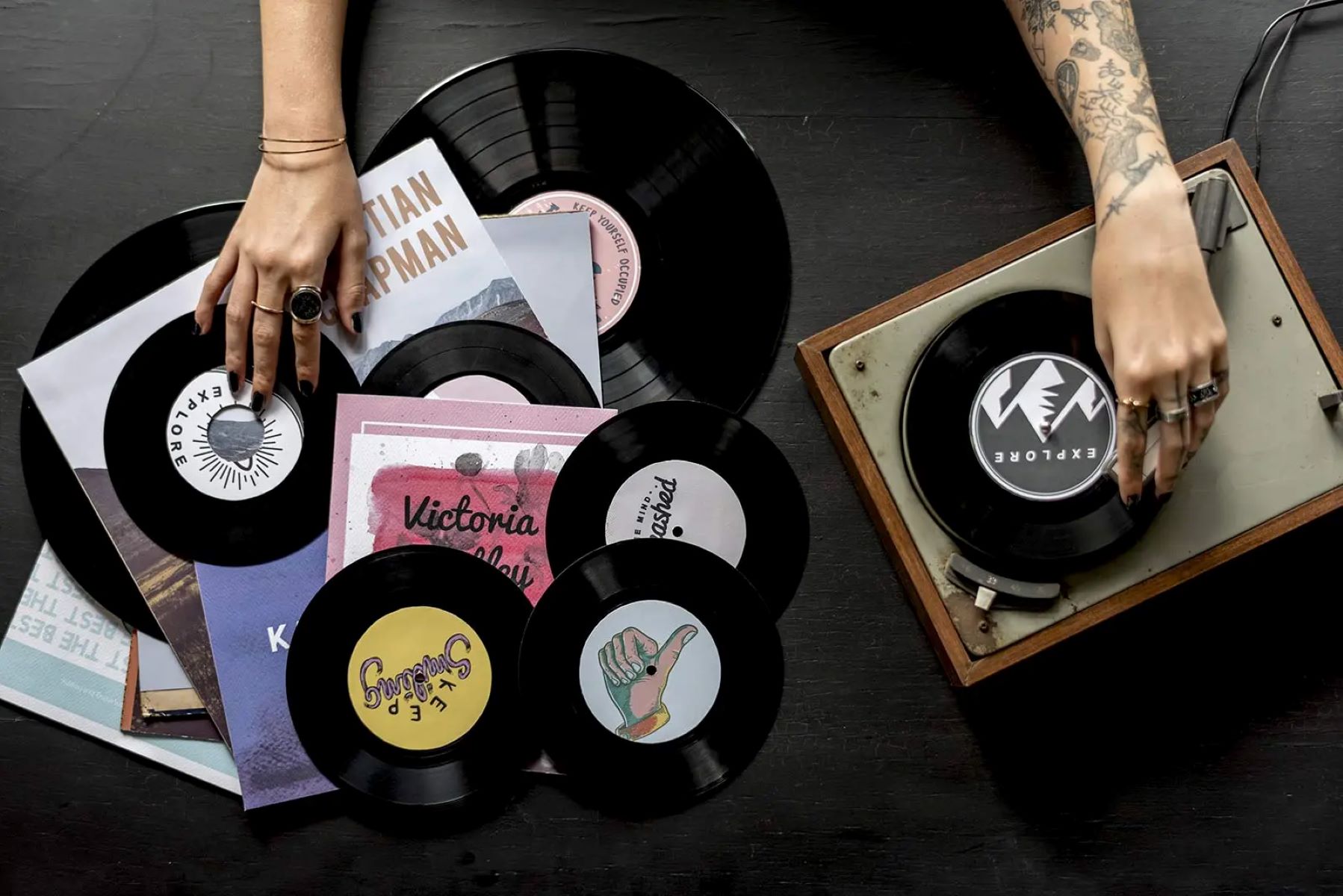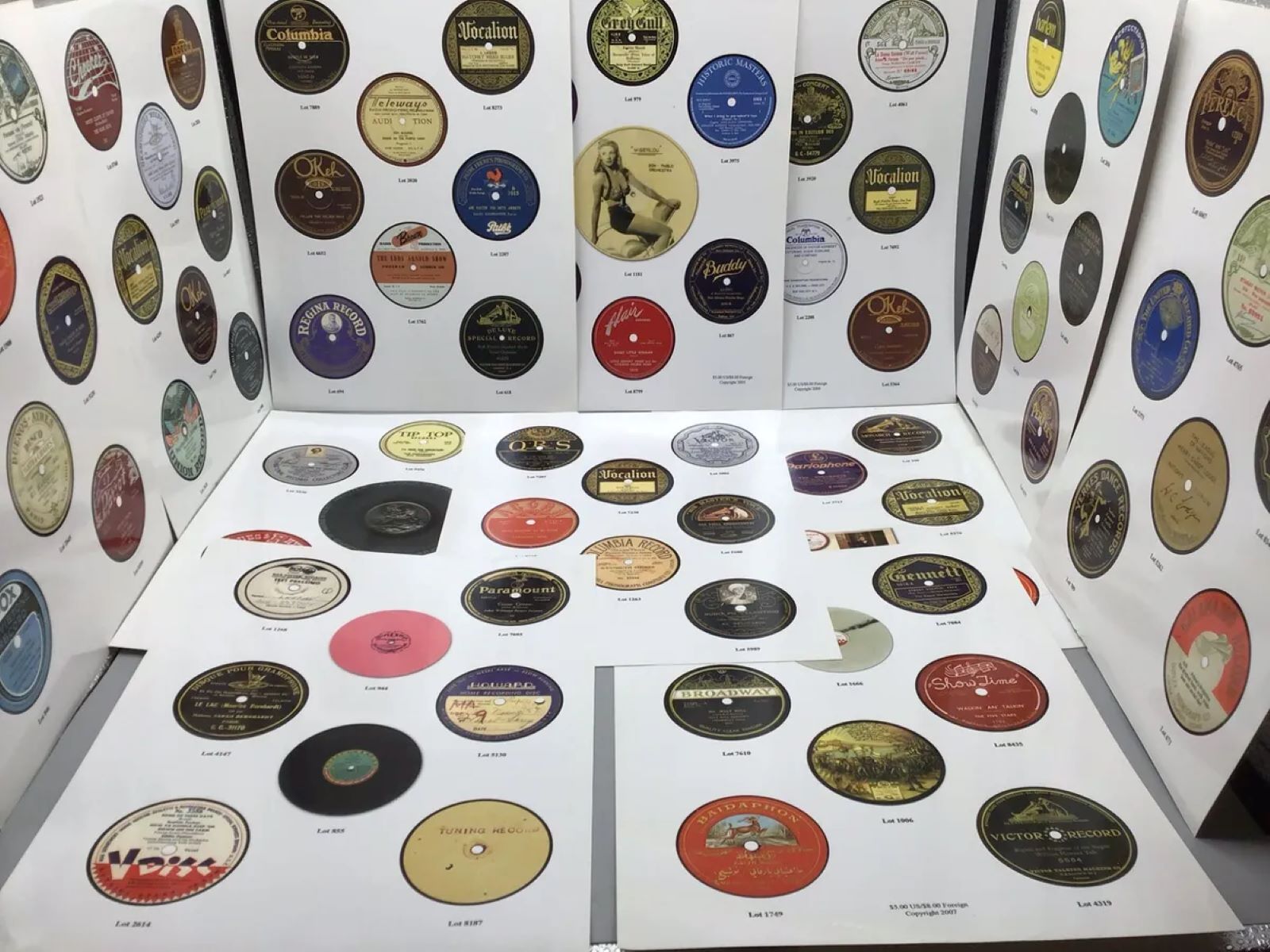Home>Production & Technology>Record Label>How To Sell Lyrics To A Record Label


Record Label
How To Sell Lyrics To A Record Label
Published: January 24, 2024
Learn how to sell your lyrics to a record label and get noticed in the music industry. Find out the step-by-step process and tips to maximize your chances of success.
(Many of the links in this article redirect to a specific reviewed product. Your purchase of these products through affiliate links helps to generate commission for AudioLover.com, at no extra cost. Learn more)
Table of Contents
Introduction
Welcome to the world of music, where lyrics have the power to move souls and create unforgettable melodies. If you are a talented songwriter and dream of having your lyrics performed by artists, then selling your lyrics to a record label might be the next step in your journey.
Record labels play a vital role in the music industry, scouting for talented songwriters and artists to sign and promote. They have the resources and connections to bring your lyrics to life and turn them into chart-topping hits. However, breaking into the industry and catching the attention of record labels can be a challenging and competitive process.
In this article, we will guide you through the process of selling your lyrics to a record label. We will provide you with essential tips and insights to help you navigate through this exciting journey. From researching the right record labels to preparing your lyrics, creating demos, and finally submitting your work, we’ll cover it all.
Whether you’re a seasoned lyricist looking for new opportunities or a budding songwriter ready to make your mark, this article will equip you with the knowledge and guidance you need to showcase your talents and increase your chances of success.
So, if you’re ready to embark on the adventure of selling your lyrics to a record label, let’s dive in and explore the steps to take, the strategies to employ, and the keys to capturing the attention of record label A&Rs.
Researching Record Labels
Before you start approaching record labels with your lyrics, it’s crucial to do your research and find the right labels that align with your musical style and genre. Not all record labels are the same, and each one has its own unique roster of artists and musical preferences.
Start by identifying the genre of your lyrics. Are they pop, rock, hip-hop, country, or another genre? Understanding the genre will help you narrow down your search for the right record labels. Look for labels that have a history of signing artists in that genre and have a successful track record in promoting and marketing similar music.
Make a list of record labels that interest you and dig deeper into their artists’ catalog and music releases. Consider factors like the label’s reputation in the industry, the level of success their artists have achieved, and their overall musical direction. It’s essential to find a record label that shares your artistic vision and has the potential to take your lyrics to the next level.
Research the artists signed to these record labels. Are they similar in style or sound to your lyrics? Take note of the artists you believe your lyrics would be a good fit for, as this information will come in handy when pitching your work.
In addition to the genre and artists, consider the size and scope of the record label. Some labels specialize in developing independent artists, while others focus on established acts. Think about where you currently are in your songwriting journey and target labels that cater to your needs and aspirations.
Utilize online resources, such as music industry websites, social media platforms, and music forums, to gather information about the record labels on your list. Pay attention to any submission guidelines they may have and take note of any upcoming showcases or events where you can network with industry professionals.
Remember, your goal is to find the record labels that are the best fit for your lyrics and increase your chances of getting noticed. Take the time to research and narrow down your options before proceeding to the next steps in your journey to sell your lyrics to a record label.
Preparing Your Lyrics
Once you have identified the record labels you want to target, it’s time to focus on preparing your lyrics. This step involves refining and polishing your work to make it stand out and capture the attention of record label representatives.
Start by reviewing and revising your lyrics. Make sure they are well-written, convey your intended message clearly, and have a strong emotional impact. Consider seeking feedback from trusted friends, fellow songwriters, or professionals in the music industry. Their insights can help you identify areas that may need improvement and ensure your lyrics are at their best.
Aside from the content, pay attention to the structure and format of your lyrics. Use proper grammar, punctuation, and capitalization. Break your lyrics into verses and choruses, creating a clear and organized flow. This makes it easier for artists and label executives to imagine how your lyrics can be transformed into a complete song.
In addition to the structure, make sure your lyrics are relatable and resonate with a broad audience. While personal experiences and unique perspectives are valuable, it’s important to strike a balance and write in a way that connects with people on a universal level. This increases the commercial appeal and marketability of your lyrics.
Consider the musicality of your lyrics as well. Pay attention to the rhythm, rhyming patterns, and melody potential. Record label representatives are not only looking for well-written lyrics, but they also want lyrics that can be easily transformed into memorable songs. If possible, collaborate with a musician or composer to create a basic melody or instrumental accompaniment for your lyrics, enhancing their overall appeal.
During this preparation stage, it’s also a good idea to create a portfolio or press kit for your lyrics. Include a short bio that highlights your songwriting experience and any notable achievements. You may also include samples of your previous work or testimonials from other artists or industry professionals who have praised your songwriting skills.
By investing time and effort into preparing your lyrics, you can present them in the best light to record label executives. Remember, first impressions matter, and demonstrating the quality and potential of your lyrics increases your chances of catching attention and making a lasting impact.
Formatting Your Lyrics
Formatting your lyrics properly is an important step in making them clear, accessible, and professional-looking. A well-formatted lyric sheet not only makes it easier for artists and record label representatives to read and understand your work, but it also showcases your attention to detail and commitment to professionalism.
Here are some tips for formatting your lyrics:
- Use a legible font: Choose a font that is easy to read, such as Arial, Times New Roman, or Calibri. Stick to a standard font size of 12 or 14 points to ensure readability.
- Indentation and line breaks: Indent new verses and choruses to clearly separate them from each other. Use line breaks to create a clear structure and make it easier to follow the flow of the lyrics.
- Capitalization and punctuation: Use proper capitalization and punctuation to enhance clarity and readability. Capitalize the first letter of each line and use punctuation marks where appropriate.
- Verse and chorus labels: Clearly label each verse and chorus to indicate their respective sections. This helps artists and record label representatives understand the structure of your lyrics and envision the song’s arrangement.
- Chords and chord symbols: If you have musical knowledge, consider including chord symbols above the lyrics to indicate the suggested harmony. This provides additional guidance to artists and allows them to envision the musical accompaniment for your lyrics.
- Additional notes or instructions: If there are specific instructions or notes related to the performance or delivery of your lyrics, such as vocal dynamics or tempo changes, you can include them in a separate section or as footnotes.
- Use a consistent format: Maintain consistency in your formatting throughout the lyric sheet. This includes font style, size, spacing, and any additional elements you choose to include.
Remember, the goal is to present your lyrics in a clean and professional manner. Avoid unnecessary embellishments or distracting elements that may take away from the focus on your lyrical content. A well-formatted lyric sheet not only showcases your professionalism, but it also helps convey the potential of your lyrics to record label representatives evaluating your work.
Copyrighting Your Lyrics
Copyrighting your lyrics is an essential step in protecting your intellectual property and ensuring that you maintain the rights to your creative work. While your lyrics are automatically protected by copyright as soon as you create them, registering your lyrics with the appropriate authorities provides you with additional legal protection and evidence of ownership.
Here’s how you can copyright your lyrics:
- Register with a copyright office: Research the copyright office in your country and find out the process for registering your lyrics. In the United States, you can register your lyrics with the U.S. Copyright Office online or through mail.
- Prepare the necessary documents: Fill out the required application forms for copyright registration. This typically involves providing information about yourself as the copyright owner and the specifics of your lyrics, such as the title and the date of creation.
- Pay the registration fee: There is usually a fee associated with copyright registration. Make sure to check the current fee and follow the payment instructions provided by the copyright office.
- Submit your application: File your application and submit it to the copyright office according to their guidelines. This may involve mailing physical copies of your lyrics or submitting them electronically, depending on the requirements.
- Keep your copyright documents safe: Once you receive confirmation of your copyright registration, keep the documents in a safe place. These documents serve as proof of your copyright ownership and will be crucial in case of any legal disputes or infringement claims.
Copyrighting your lyrics not only protects your intellectual property, but it also adds credibility and professionalism to your work. When approaching record labels, having copyright registration demonstrates that you take your songwriting seriously and have taken the necessary steps to protect your creative rights.
Remember, while copyright registration is not a requirement for claiming copyright protection, it provides added legal protection and strengthens your case in the event of any copyright disputes.
Creating a Demo
Creating a demo is an essential step in showcasing the potential of your lyrics to record labels and artists. A demo serves as a sample of how your lyrics can be transformed into a complete song and allows others to visualize the final product. Here are some tips to help you create an effective demo:
- Choose the right format: Decide on the format of your demo based on your resources and capabilities. It can be a simple acoustic guitar or piano recording, a fully produced demo with instrumentals and vocals, or even a high-quality MIDI arrangement.
- Hire professional musicians if necessary: If you don’t possess the necessary musical skills, consider hiring professional musicians to bring your lyrics to life. This ensures a polished and professional sound that aligns with your artistic vision.
- Focus on the melody: Pay close attention to the melody of your demo. A strong and catchy melody can significantly impact the listener’s perception of your lyrics. Experiment with different melodies and arrangements to find the one that best complements your lyrics.
- Quality recording and production: Invest in high-quality recording equipment or seek help from a professional recording studio to ensure that your demo sounds clear and professional. A well-produced demo will make a better impression on record labels and artists.
- Vocals matter: If you’re not a confident singer, consider collaborating with a talented vocalist to bring your lyrics to life. The vocals should effectively convey the emotions and nuances of your lyrics.
- Keep it concise: Keep your demo to a reasonable length, typically between two to four minutes. This allows the listener to get a taste of your lyrics without losing interest.
- Add a cover sheet: Include a cover sheet for your demo that provides essential information such as the title of the song, your contact details, and a brief description of the lyrics and musical style.
- Make multiple versions: Consider creating different versions of your demo. For example, a full arrangement, an acoustic version, or an alternative interpretation. This showcases the versatility of your lyrics and gives artists and record label representatives more options to work with.
Remember, a demo is your opportunity to showcase the potential of your lyrics. Make sure it represents your work in the best possible light and captures the attention and imagination of the listener.
Writing a Query Letter
Once you have your demo ready, it’s time to create a compelling query letter to accompany your submission. A query letter is your chance to introduce yourself, showcase your lyrics, and grab the attention of record label representatives. Here are some tips to help you write an effective query letter:
- Personalize your letter: Address the letter to a specific person whenever possible. Research the record label and find the appropriate contact for submitting your lyrics. This personal touch shows that you have done your homework and are genuinely interested in working with their label.
- Be concise and clear: Keep your letter brief and to the point. State the purpose of your letter right away, which is to present your lyrics for consideration. Avoid lengthy paragraphs and unnecessary details.
- Introduce yourself and your work: Briefly introduce yourself as a songwriter and mention any notable achievements or experiences. Highlight the unique qualities of your lyrics and what makes them stand out.
- Include a compelling hook: Start your query letter with a strong hook that immediately grabs the reader’s attention. This can be a powerful line from your lyrics or a brief description of the emotional impact your song can have.
- Showcase your lyrics: Provide a summary of your lyrics and the story they tell. Highlight any distinctive themes, messages, or imagery. Give the reader a taste of your lyrical style and how your words can resonate with listeners.
- Explain the vision: Share your vision for how the lyrics can be transformed into a complete song. Discuss the potential genre, sound, and arrangement. This helps the label representatives envision the commercial potential of your lyrics.
- Mention your demo: Indicate that you have a demo available for their review and include any relevant details like the format or link to access the demo. Offer to provide the demo upon request or attach a physical copy to the letter.
- Include your contact information: Provide your contact details, including your name, phone number, email address, and any relevant social media or website links. Make it easy for the label representatives to reach out to you.
- Express gratitude and professionalism: End your query letter by expressing your gratitude for their time and consideration. Remain professional and courteous throughout the letter.
Remember, your query letter is your opportunity to make a strong impression with record label representatives. Craft a well-written and engaging letter that showcases your passion, talent, and unique voice as a songwriter.
Submitting Your Work
Submitting your work to record labels is an exciting and nerve-wracking step in your journey to sell your lyrics. It’s important to approach this process with professionalism and attention to detail. Here are some tips for submitting your work:
- Follow submission guidelines: Carefully review the submission guidelines provided by each record label. Some labels may prefer digital submissions, while others may require physical copies. Follow their instructions precisely to ensure that your submission doesn’t get overlooked.
- Prepare your materials: Gather all the necessary materials, including your demo, query letter, and any additional requested items such as a biography or press kit. Make sure your materials are organized, labeled, and ready for submission.
- Keep copies for yourself: Before submitting your work, make copies or backups of all your materials. This includes your demo, query letter, and any other supporting documents. It’s essential to have these copies for your records in case anything gets lost or misplaced.
- Send it to the right contact: Address your submission to the appropriate person or department mentioned in the submission guidelines. If a specific A&R representative or department is mentioned, direct your submission to them. This shows that you’ve done your research and are taking the process seriously.
- Consider using a tracking method: If you’re submitting physical copies, consider using a tracking method like registered mail or courier services. This allows you to track the progress of your submission and ensure that it has been received by the intended recipient.
- Be patient: After submitting your work, be patient and allow time for the record label representatives to review your material. Avoid the temptation to follow up too soon, as this can come across as pushy. Respect their process and wait for a reasonable time before considering follow-up actions.
- Keep pursuing other opportunities: While waiting for a response from record labels, continue to explore and pursue other opportunities. Submit your work to multiple labels or explore alternative avenues, such as music publishers or independent artists.
Remember, the submission process can take time, and the response may not always be immediate. Stay persistent, keep honing your craft, and explore various avenues to increase your chances of success.
Following Up with Record Labels
Following up with record labels after submitting your work is a crucial step in maintaining contact and potentially securing a response. While it’s important to be proactive, it’s equally important to approach follow-ups with professionalism and respect. Here are some tips for following up with record labels:
- Wait for an appropriate amount of time: Give the record label ample time to review your submission before reaching out. The timeframe can vary, but a general guideline is to wait at least four to six weeks before following up. This allows the label representatives sufficient time to listen to your demo and consider your submission.
- Use the preferred method of communication: Review the record label’s submission guidelines to determine their preferred method of communication regarding follow-ups. Some labels may prefer email, while others may prefer phone calls or even in-person meetings. Follow their guidelines to ensure that your follow-up message reaches the right person.
- Be polite and professional: When reaching out for a follow-up, maintain a polite and professional tone. Thank the label representatives for their time and consideration, and express your continued interest in working with them. Avoid sounding desperate or impatient in your message.
- Remind them of your submission: In your follow-up, remind the record label representatives about your previous submission. Mention the title of your song or the content of your lyrics to jog their memory. This helps them connect your follow-up message with your original submission.
- Ask for an update: Inquire about the status of your submission and politely ask if they have had a chance to review your work. Keep your message concise and to the point, and avoid pressuring them for an immediate response.
- Provide additional information: If you have any new updates or achievements since your initial submission, such as a new song release or performance, mention it in your follow-up. This demonstrates your continued progress and dedication to your craft.
- Keep the conversation open-ended: Close your follow-up message by expressing your willingness to provide any additional information or answer any questions they may have. Keep the conversation open-ended to encourage further communication and engagement.
- Respect their response time: After sending your follow-up message, give the label representatives an appropriate amount of time to respond. Be patient and avoid sending multiple follow-ups in quick succession, as this can be perceived as bothersome.
Remember, following up is an opportunity to show your continued interest and initiative, but it’s important to strike the right balance between being proactive and respectful. Maintain professionalism throughout the follow-up process, and keep pursuing other opportunities while awaiting responses from record labels.
Negotiating and Finalizing a Deal
Once a record label has shown interest in your lyrics, it’s time to enter into the negotiation and finalization stage. This is an exciting and critical part of the process where you have the opportunity to discuss the terms of the deal and solidify your partnership. Here are some tips for negotiating and finalizing a deal:
- Understand the offer: Take the time to fully comprehend the offer presented by the record label. This includes understanding the financial terms, royalties, publishing rights, and any other contractual obligations. Seek legal advice if necessary to ensure you’re making informed decisions.
- Know your worth: Have a clear understanding of the value and potential of your lyrics. Consider factors such as your level of experience, the demand for your genre, and your creative vision. This will help you negotiate from a position of strength.
- Consider the big picture: Look beyond the immediate financial aspects and think about the long-term benefits of partnering with a particular record label. Evaluate their track record, marketing strategies, and distribution capabilities. Assess if their vision aligns with yours and if they can help you reach your goals as a songwriter.
- Collaborate and compromise: Negotiation is a two-way process. Be open to listening to the record label’s perspective and ideas. Seek ways to find a compromise that satisfies both parties and ensures a mutually beneficial relationship.
- Seek professional assistance: If negotiations become complex or you feel unsure about certain aspects of the agreement, consider seeking assistance from a lawyer or industry professional who specializes in music contracts. They can help ensure your interests are protected and guide you through the process.
- Document the agreement: Once the terms of the deal have been agreed upon, it’s crucial to document them in a formal contract. This contract should outline all the agreed-upon details, including rights, royalties, duration, and any additional provisions. Having a written agreement protects both parties and ensures transparency.
- Review the contract carefully: Before signing any contract, thoroughly review all the clauses and obligations. Make sure you fully understand the terms and seek clarification on anything that seems unclear or raises concerns. Only sign the contract when you’re confident that you are comfortable with its contents.
- Keep communication open: Maintain open and clear communication with the record label throughout the negotiation and finalization process. Address any questions or concerns promptly, and keep all parties informed of any changes or updates.
- Celebrate and move forward: Once the deal is finalized and the contract is signed, take a moment to celebrate your achievement. However, remember that the journey is just beginning. Continue collaborating with the record label, stay committed to your craft, and work together to bring your lyrics to life.
Negotiating and finalizing a deal with a record label can be a fulfilling and transformative experience for a songwriter. Use these tips to navigate the process with confidence and ensure that you are entering into a partnership that supports your creative vision and career aspirations.
Conclusion
Congratulations! You have now journeyed through the process of selling your lyrics to a record label. From researching and preparing your lyrics to creating demos, writing query letters, and submitting your work, you have followed the necessary steps to showcase your talent and catch the attention of record label representatives.
Throughout this process, remember to stay true to your artistic vision and believe in the power of your lyrics. The music industry can be competitive and challenging, but with perseverance and dedication, you can make a lasting impact and find success.
As you continue on your songwriting journey, keep refining your craft, learning from experiences, and taking advantage of networking opportunities. Collaborate with other musicians, keep exploring new genres and styles, and stay open to feedback and growth.
Remember that selling your lyrics to a record label is just one avenue to showcase your talent. There are various other avenues to explore, including working with independent artists, licensing your songs for commercial use, or even releasing your own music as an artist.
Ultimately, the goal is to share your talent with the world and touch the hearts and minds of listeners. Stay committed to your craft, adapt to the ever-changing music industry trends, and continue honing your skills as a lyricist.
So, take what you’ve learned from this article, apply it to your songwriting journey, and embrace the opportunities that come your way. Believe in yourself and your lyrics, and let your passion shine through in every word you write. Who knows, your lyrics may become the soundtrack to someone’s life and leave an indelible mark on the world of music.











